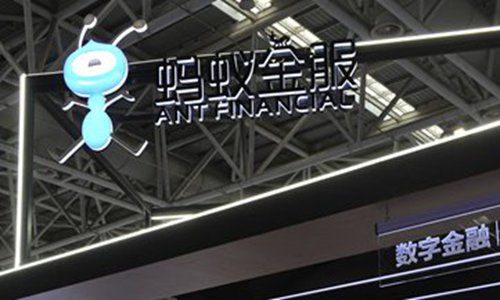Ant Group’s Shanghai IPO put on hold
By GT staff reporters Source: Global Times Published: 2020/11/3 21:50:46

People visit the Ant Financial stand at an digital economy exhibition in Fuzhou, East China's Fujian Province on April 25. Photo: VCG
Tougher regulation on China's white-hot fintech business has arrived, after the Shanghai Stock Exchange surprised market investors with an abrupt announcement late on Tuesday that it will suspend Ant Group's IPO in the STAR Market, as regulators and the public debate the balance between financial innovation and risk control.
Ant Group is reportedly being asked to clarify on its business model, financial innovations, measures to protect users' private data the platform has collected, and other issues. It is also possible that the fintech venture could be asked to restructure its business, analysts say.
Ant Group's actual controller and management were called in on Monday by the nation's top financial regulators. There have been changes to the fintech regulatory environment in which the firm operates, the Shanghai bourse said in a statement, noting such major event might result in Ant Group "failing to comply with listing requirements or information disclosure procedures".
Too much innovation that overburdens the regulatory regime could result in a fintech bubble which, in the worst-case scenario, drags the nation's internet-savvy population into a nightmare of false prosperity that might go bust, some experts have warned.
With the regulators spelling out a tougher stance on fintech innovations, including proposed tighter rules for online personal loans, financial Big-Techs — increasingly seen as rivals to traditional banks — will inevitably be subject to more supervising curbs, experts said.
Ahead of its record-smashing dual listing in Shanghai and Hong Kong, Jack Ma and Ant Group management were summoned for a talk by the People's Bank of China (PBC), the central bank, the China Banking and Insurance Regulatory Commission (CBIRC), the China Securities Regulatory Commission (CSRC), and the State Administration of Foreign Exchange.
Fintech giants, albeit differing from traditional financial institutions in business structures, are still in essence financial service providers, Lian Ping, head of Zhixin Investment Research Institute, told the Global Times on Tuesday.
Nonetheless, while traditional institutions have long been falling under the purview of financial regulators, higher risk tolerance has been a focus in policy responses to fintech, Lian said. Regulatory tolerance has led to an outpouring of innovations, but regulators have shown themselves to be taking a tougher stance.
In a sign of China's fintech prowess, the nation's mobile payment market totaled $414 billion in 2018, while the marketplace for mobile payments was only worth $64 billion in the US, according to a report by China International Capital Corp.
China holds an edge in commercial applications of the digital economy, in that the nation has more application scenarios, a huge market and fewer obstacles to innovation, according to the September report.
Monday's summons focused attention on regulatory toughening, however. Coincidentally, proposals released by the PBC and CBIRC on Monday set a 300,000 yuan ($44,850) cap on loans extended to a single individual. In the case of an entity, loans can't exceed 1 million yuan.
Companies seeking to engage in the online loan business must also meet high regulatory requirements, according to the proposal.
The ceiling on online lending could weigh on loan services by fintech giants such as Ant Group and Tencent's WeChat, as the amount of loans individuals can seek from different platforms, is likely to be capped, a fintech industry veteran in Shanghai told the Global Times on Tuesday on condition of anonymity.
This might not be good news for Ant Group, whose Huabei and Jiebei products are considered the company's cash cows. In an application proof filed with the Hong Kong bourse in late October, Ant Group said the duo "have become the most widely used consumer credit products in China."
During the 12 months ended June 30, the fintech giant enabled credit balances for roughly 500 million users.
A typical customer of Huabei, Ant Group's virtual credit payment vehicle, is described as young and internet savvy, with "unmet consumption demand due to the lack of a credit card or insufficient credit limits."
Jiebei, Ant Group's short-term digital unsecured consumer credit service, offers instant credit for qualified customers identified by Ant Group's AI-aided systems.
The availability of such credit and loans could easily amplify risks of excessive spending by consumers, especially considering that Ant Group's Alipay and Wechat Pay have grown way beyond mobile payment apps.
They are mainstays of public infrastructure, which enable access to healthcare, social security, hospital registration and school admission, among wide-ranging daily necessities, the industry veteran said.
There's sufficient innovation, but a well-functioning regulatory framework that crystallizes obligations and responsibilities isn't yet in place. So there may actually be too much innovation, and that could lead to a worst-case scenario in which consumers take on too much debt, especially amid any economic downturns, with a surge in bad loans.
In a widely circulated commentary on Monday, Guo Wuping, head of the consumer rights protection division at the CBIRC, wrote that compared with licensed financial institutions, fintech firms rely more on behavioral data such as shopping, transactions and logistics, and they are more dependent on borrowers' consumption and loan payment willingness, so it's hard for them to evaluate creditworthiness.
Some low-income people and young consumers might get mired in debt traps, eventually undermining consumer rights, and even causing damage to households and society.
Huabei was singled out in the commentary, as it was considered to be similar to bank credit card services, although it asks for higher installment fees than banks, and this is not in accordance with its claim to be pushing for inclusive finance.
RELATED ARTICLES: